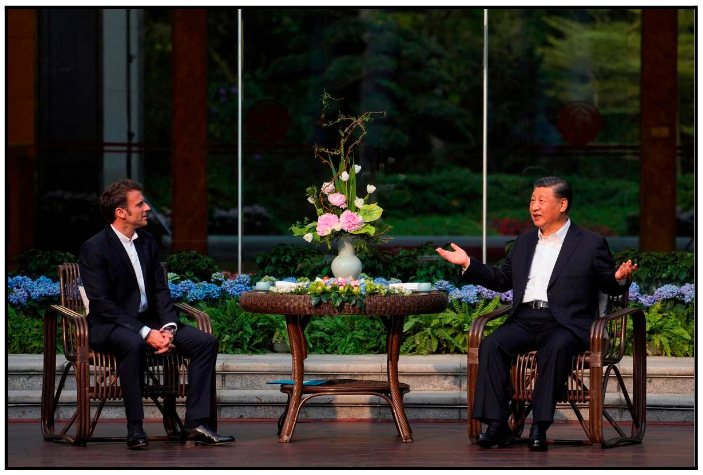On April 5, French President Emmanuel Macron arrived in Beijing, commencing one of the more controversial diplomatic visits in recent memory. Ostensibly driven by a desire to simultaneously obtain Chinese support for a negotiated settlement to the Russia-Ukraine War and maintain France’s lucrative economic ties with the People’s Republic of China (PRC), Macron struck a relatively conciliatory tone in his discussions with Chinese Communist Party (CCP) General Secretary Xi Jinping (習近平). While Macron’s willingness to engage with Xi on his home turf was certainly notable in its own right—especially given Europe’s mounting uneasiness about Chinese influence—it was the French president’s comments during and after the visit that triggered alarm bells in both Washington and Taipei.
In addition to its aforementioned political and economic dimensions, the trip also provided Macron with a highly visible platform to advocate for European “strategic autonomy.” Wary of what he views as undue US influence in European affairs, Macron has long pushed for Europe—and more specifically, the European Union (EU)—to chart its own path in the international system, allowing it to function as a third superpower (alongside the United States and China). While such an impulse is understandable, the French president has repeatedly demonstrated support for contrarian geopolitical stances as a means of asserting his country’s “autonomy.” This tendency was on full display in the wake of the China visit, when Macron declared that the EU should avoid following the United States into a conflict over Taiwan, arguing that the bloc should steer clear of “crises that are not ours.” For both the United States and Taiwan, these comments should undoubtedly be concerning, especially as they were made as China was undertaking large-scale military exercises around Taiwan. However, subsequent European pushback against Macron’s rhetoric should inspire confidence that the French leader does not speak for the whole continent.

Image: Chinese President Xi Jinping and French President Emmanuel Macron meeting in Guangzhou on April 7. (Image source: Reuters)
Macron’s China Gamble
For Macron, the April visit to the PRC served a variety of purposes. According to an official release issued by the President’s Office, the primary objective of the trip was to “involve China in shared responsibility for peace and stability,” particularly as it pertains to the ongoing Russian invasion of Ukraine. Given Xi’s well-publicized friendship with Russian President Vladimir Putin and the PRC’s strong trade links with the isolated Russian economy, Macron evidently hoped to convince the Chinese leader to pressure Putin into a negotiated end to the war. However, as many commentators have noted, he faced an uphill battle on this front. With the war in Ukraine tying down a large proportion of Western military assets, Xi has little impetus to bring an end to the conflict. Indeed, Macron failed to secure any substantive commitments from Beijing, with Xi refusing to even speak with Ukrainian President Volodymyr Zelenskyy.
Beyond these arguably naïve geopolitical objectives, Macron’s visit also had significant—and more substantive—economic implications. Rather than treating the trip as a solo diplomatic mission, the president arrived in Beijing flanked by a large contingent of French business representatives. Even as Macron failed in his pursuit of meaningful progress on Ukraine, his delegation succeeded in negotiating several trade deals with their Chinese counterparts, including agreements on “transport, energy, agriculture, culture and science.” While these deals were framed as positive developments by some, many others were not so sanguine. As some have contended, the signing of such agreements—and indeed, the very presence of the business representatives on the trip—demonstrates Macron’s willingness to place economic interests over broader European security concerns.
For Macron, the visit represented something of a gamble. Domestically, the president has been facing widespread popular discontent in the wake of a controversial decision to raise the national retirement age. Amid protests that have paralyzed the economy, the president’s approval rating hit record lows in March, with just 23 percent of French citizens expressing approval of his performance. Accordingly, the visit has been framed by some as an attempt at a reset for Macron, ideally allowing him to draw attention away from his domestic troubles while simultaneously distinguishing himself as a leading figure in European foreign policy. On the first count, the visit was arguably a failure, as protests have continued to rage across France. On the second, however, the picture is considerably more complex.
For much of his tenure in office, Macron has sought to position himself as a leader of the European Union, a primus inter pares serving as the public face for the increasingly powerful grouping. As part of this effort, he has long pushed for “strategic autonomy,” arguing that the EU should act more proactively and independently in pursuit of its own interests. This rhetoric has only grown more forceful following former German Chancellor Angela Merkel’s retirement in 2021. As president of one of Europe’s most powerful and wealthy countries, Macron is perhaps justified in seeking a leadership role within a more autonomous EU. However, his skepticism of the United States and readiness to embrace Beijing could have severe consequences, both for the transatlantic relationship and for the EU’s unity on Taiwan and China policy.
Strategic Autonomy, the United States, and Taiwan
During his first major policy speech as president in 2017, Macron provided the outlines of what would soon become a key element of his foreign policy agenda: European strategic autonomy. Concerned about European overreliance on the United States—particularly in terms of defense—he has pushed for European states to forge a new path. At least initially, this rhetoric focused on improving European production capacity and reducing dependencies on foreign goods, including energy. However, as Macron’s recent comments have made clear, he has become considerably more aggressive in his thinking.
Speaking with Politico in the midst of his China visit, Macron revealed a far more skeptical view on the relationship between the European Union and the United States. Specifically, he stated that “[t]he paradox would be that, overcome with panic, we believe we are just America’s followers.” When asked about a potential conflict in the Taiwan Strait, Macron doubled down, arguing that:
The question Europeans need to answer […] is it in our interest to accelerate [a crisis] on Taiwan? No. The worse thing would be to think that we Europeans must become followers on this topic and take our cue from the US agenda and a Chinese overreaction.
Building on this sentiment, Macron also questioned the value of European involvement in the Taiwan Strait, arguing that if “Europeans cannot resolve the crisis in Ukraine; how can we credibly say on Taiwan, ‘watch out, if you do something wrong, we will be there?’”
While these statements were relatively strong in their own right, they were evidently less bold than others made during the interview. According to a disclaimer at the bottom of the published interview, Politico clarified that Macron’s office had insisted on reviewing the content of the article. Notably, the disclaimer included a statement that “parts of the interview in which the president spoke even more frankly about Taiwan and Europe’s strategic autonomy were cut out.”
In the days following his visit to China, Macron continued to defend and elaborate on his comments. During a press conference in the Netherlands on April 12, he stated that “Being an ally [of the United States] does not mean being a vassal […] doesn’t mean that we don’t have the right to think for ourselves.” While Macron clarified that France continues to support the status quo in the Taiwan Strait, his comments have nevertheless proven highly controversial in Europe, the United States, and Taiwan.
Taken together, Macron’s statements represent a notable departure from standard EU rhetoric, particularly as it pertains to Taiwan. While EU states have long held Taipei at arm’s length, many have increasingly worked to expand their ties with the island democracy in recent years. This shift in behavior has been accompanied by a corresponding warming in rhetoric. Since 2020, the EU has substantially expanded its language on Taiwan, releasing multiple high-level documents and statements praising Taiwan for its democracy, commitment to human rights, and strong economic performance. Simultaneously, the EU has also hardened its rhetoric on China, expressing concern about Beijing’s aggressive actions in the Taiwan Strait and stressing the importance of maintaining the status quo. With these shifts in mind, Macron’s comments are all the more striking.
While Macron’s statements were ostensibly intended to strengthen Europe’s hand in negotiations with the United States and China, they have the potential to carry out the opposite effect. As the continent’s response to the Russian invasion of Ukraine has made clear, presenting a unified front is a crucial means of countering authoritarian aggression. By challenging the EU’s position on the United States and Taiwan, Macron could potentially play directly into the PRC’s hands, dividing the EU at a time when unity is more necessary than ever. However, as the European pushback to his comments has demonstrated, EU unity is not so easily undermined. For both Washington and Taipei, this should be an encouraging development.
European Responses to Macron’s Comments
In the wake of Macron’s comments, many commentators opined that the French leader had potentially undermined the EU’s fragile unity. This response was ironic, as Macron had intended for the trip to highlight Europe’s unified approach to China, even including European Commission President Ursula von der Leyen—a strong proponent of EU solidarity—in his delegation. By questioning the continent’s relations with the United States and engaging warmly with Xi, the French president directly challenged the approaches of many EU states, forcing them to make uncomfortable diplomatic choices. Fortunately for Taiwan and the United States, Macron does not seem to have received the response he expected.
Rather than supporting Macron’s more skeptical views on the US role in Europe, many EU officials pushed back. Across the continent, political figures and analysts criticized the president, describing his comments as “a disaster” and “a political coup [for Xi Jinping].” This reaction was particularly pronounced in Central and Eastern Europe (CEE), where a swath of leaders have firmly rejected Macron’s proposals. For instance, Polish Prime Minister Mateusz Morawiecki argued that “[i]nstead of building strategic autonomy from the United States, I propose a strategic partnership with the United States.” This sentiment was echoed elsewhere in the region, where an anonymous diplomat stated that “[i]t is not the first time that Macron has expressed views that are his own and do not represent the EU’s position.” While this response from CEE states was certainly notable for its intensity, it should perhaps not be surprising, as the region has made news in recent years for its unprecedented embrace of Taiwan.
Taken as a whole, Macron’s controversial trip to China may prove to be far less damaging as many of its critics initially feared. While his rhetoric was undoubtedly divisive and poorly timed, the response to his comments suggest that Europe is more unified than it might appear. For both Taiwan and the United States, the episode could potentially serve as a source of encouragement, though not without reservations. As Macron has made clear, European support for the United States and Taiwan is far from unanimous. As the two continue to seek greater transatlantic unity in approaching China, they would be wise to keep this in mind.
The main point: French President Emmanuel Macron’s comments during and after his controversial visit to China have sparked debate across Europe, contributing to concerns that he could undermine transatlantic ties and erode EU unity. However, the intense European backlash to the remarks suggest that the EU is unlikely to alter its approach to the United States and Taiwan in the near future, though France’s strategy remains unclear.




